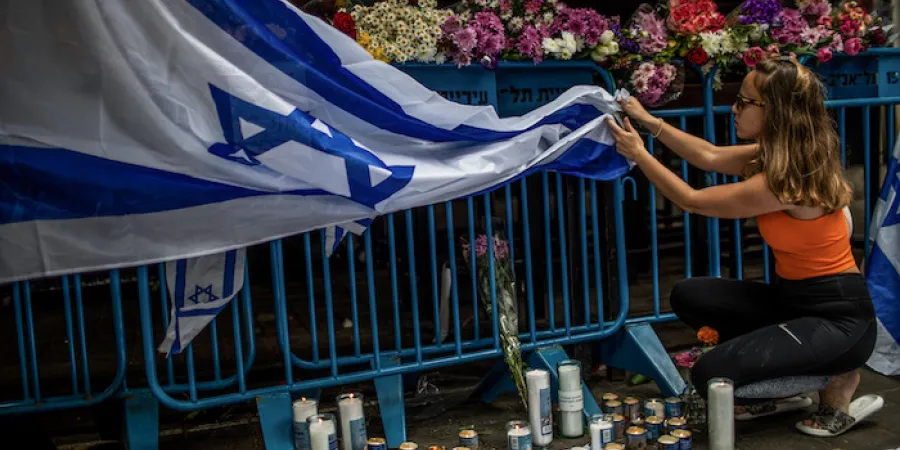Israel fights war of online incitement
A new study reviews how Palestinian terrorist groups have been using social media as platforms calling for more terror attacks
Mandi Kogosowski
| 09/05/2022
Starting in March 2022, Israel has been undergoing a wave of Palestinian terror attacks, which at the time of writing have already claimed the lives of 19 citizens throughout the country and left dozens of others wounded with various degrees of severity.
Unfortunately, the end is nowhere in sight, and while the Israeli government, army and security forces has been taking concrete actions in the physical sphere (i.e. operations in the West Bank, restrictions on movement of people and goods, initial steps to establish a civilian national guard etc.) – it has been hard to fight the proliferation of incitement and unrest fueled by social media posts, photos, videos and fake news.
A new study by the Meir Amit Intelligence and Terrorism Information Center discusses how Hamas and the Islamic Jihad has been using social media as platforms for conveying messages of hatred and incitement, along with calls to carry out terror attacks.
The Center’s researchers note that these platforms, with the constant flow of agitating information (whether real, fake or just exaggerated) are “likely to have an impact on the degree of extremism and willingness to take part in violent activities and terror acts.”
The Islamic organizations utilize all known social media. Yet, the researchers have observed a greater effort to disguise the inciting content on Facebook and Instagram than on other platforms such as WhatsApp, Telegram or TikTok, given the former’s stricter content guidelines. Most often, the content is disguised as press coverage.
Content examples include photos and caricatures praising terrorists and lauding them as heroes and freedom fighters, various fake news reports – for example that Israel is planning to invade the al-Aksa Mosque, or fake vidoes showing alleged Israeli soldiers attacking Palestinians, live feeds of demonstrations in Gaza and the West Bank “in honor” of the terrorists, and more.
Since the current wave of terror began some six weeks ago, the Cyber Department at the State Attorney’s Office has been conducting concentrated efforts aimed at blocking and removing social media content that promotes incitement to violence and terror as well as circulates fake news regarding the Temple Mount status quo. By the end of April, the team of experts reviewed over 14,000 posts, out of which 10,000 were reported.
A new study reviews how Palestinian terrorist groups have been using social media as platforms calling for more terror attacks
Starting in March 2022, Israel has been undergoing a wave of Palestinian terror attacks, which at the time of writing have already claimed the lives of 19 citizens throughout the country and left dozens of others wounded with various degrees of severity.
Unfortunately, the end is nowhere in sight, and while the Israeli government, army and security forces has been taking concrete actions in the physical sphere (i.e. operations in the West Bank, restrictions on movement of people and goods, initial steps to establish a civilian national guard etc.) – it has been hard to fight the proliferation of incitement and unrest fueled by social media posts, photos, videos and fake news.
A new study by the Meir Amit Intelligence and Terrorism Information Center discusses how Hamas and the Islamic Jihad has been using social media as platforms for conveying messages of hatred and incitement, along with calls to carry out terror attacks.
The Center’s researchers note that these platforms, with the constant flow of agitating information (whether real, fake or just exaggerated) are “likely to have an impact on the degree of extremism and willingness to take part in violent activities and terror acts.”
The Islamic organizations utilize all known social media. Yet, the researchers have observed a greater effort to disguise the inciting content on Facebook and Instagram than on other platforms such as WhatsApp, Telegram or TikTok, given the former’s stricter content guidelines. Most often, the content is disguised as press coverage.
Content examples include photos and caricatures praising terrorists and lauding them as heroes and freedom fighters, various fake news reports – for example that Israel is planning to invade the al-Aksa Mosque, or fake vidoes showing alleged Israeli soldiers attacking Palestinians, live feeds of demonstrations in Gaza and the West Bank “in honor” of the terrorists, and more.
Since the current wave of terror began some six weeks ago, the Cyber Department at the State Attorney’s Office has been conducting concentrated efforts aimed at blocking and removing social media content that promotes incitement to violence and terror as well as circulates fake news regarding the Temple Mount status quo. By the end of April, the team of experts reviewed over 14,000 posts, out of which 10,000 were reported.



